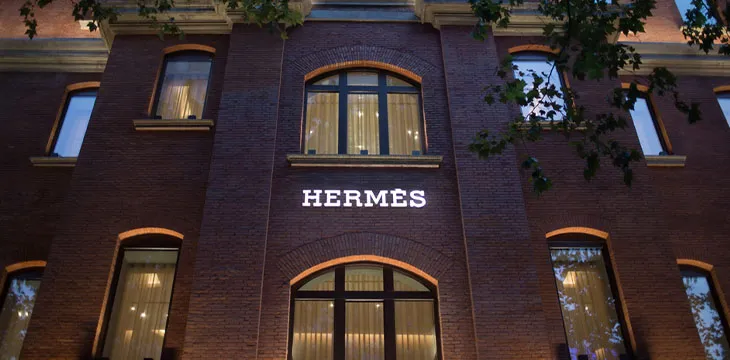|
Getting your Trinity Audio player ready...
|
French luxury goods company Hermès has won a trademark infringement dispute over the use of its famous Birkin bag in a non-fungible token (NFT) project. A jury in New York ruled that the Metabirkin NFTs are a dupe of the Birkin bags and ordered the artist to pay Hermès $133,000 in damages.
The case goes back to August 2021 when artist Mason Rothschild launched 100 Metabirkin NFTs based on Hermès’ iconic Birkin bags. A few months later, in January 2022, the French company filed a lawsuit in the Southern District of New York, arguing that the NFTs infringed on its trademark protections. Hermès said it planned on launching its own NFT project, which it had to put aside after Rothschild’s infringement.
Judge Jed Rakoff dismissed calls for a summary judgment and brought in a nine-person jury. This jury has now sided with Hermès.
A report by Vogue reveals that the jury found the artist guilty of trademark infringement, trademark dilution, and cybersquatting, or the use of a name or brand in bad faith with the intent of making money.
It further awarded $133,000 in total damages to the luxury fashion company. The jury said this is an estimation of the money Rothschild has earned from the project.
Metabirkin recorded $1.1 million in transaction volume before OpenSea took down the project. However, Rothschild only made a modest amount as his income was only from incremental revenue on secondary sales.
Rothschild criticized the ruling and vowed to appeal, with legal experts saying the lawsuit could go all the way to the Supreme Court.
https://twitter.com/MasonRothschild/status/1623367118493257730
“A broken justice system that doesn’t allow an art expert to speak on art but allows economists to speak on it. That’s what happened today. What happened today was wrong. What happened today will continue to happen if we don’t continue to fight. This is far from over,” he stated.
Metabirkin lawsuit reignites the NFT ownership debate
The year-long legal battle between Hermès and Rothschild is a significant one for the NFT industry. At its heart, it sought to deal with the question; what is an NFT?
Rothschild argued that the NFTs were artistic commentary and that the U.S. Constitution’s First Amendment protected them. Hermès, on its part, argued that any NFT based on its product is an extension of this product.
“This goes back to what is an NFT, what is art, and how artists will begin to classify that. It’s interesting for future artists who comment on social constructs in terms of branding and imagery; they will have to be really careful,” Shermin Lakha, the managing attorney at intellectual property law firm Lvlup Legal says.
Jeff Trexler, associate director of the Fashion Law Institute at Fordham University, concurs. He believes the ruling “signals that the NFT market is not a legal free-for-all — simply waving the flag of fair use will not be automatically exempt you from liability for using someone else’s IP.”
The ruling signals that an NFT holds value for a company just as a physical product would.
It comes just days after Yuga Labs, the creators of the Bored Ape Yacht Club (BAYC) NFTs, settled with Thomas Lehmann. The developer was accused of creating a website and smart contracts for the sale of 10,000 “counterfeit” NFTs known as RR/BAYC. Yuga’s legal battle with Ryder Ripps, the creator of the project, is still ongoing. The Hermès ruling could set a precedent for this legal showdown.
Watch: Buzzmint: Elevating NFTs

 07-14-2025
07-14-2025 





